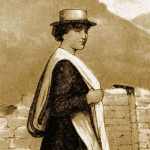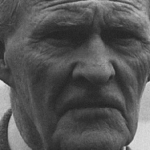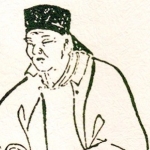all the time I pray to Buddha
a
Similar Poems:
Soliloquy on an Empty Purse by Mary Jones

Alas, my Purse! how lean and low!
My silken Purse! what art thou now!
One I beheld—but stocks will fall—
When both thy ends had wherewithal.
When I within thy slender fence
My fortune placed, and confidence;
A poet’s fortune!—not immense:
Yet, mixed with keys, and coins among,
Read Poem My silken Purse! what art thou now!
One I beheld—but stocks will fall—
When both thy ends had wherewithal.
When I within thy slender fence
My fortune placed, and confidence;
A poet’s fortune!—not immense:
Yet, mixed with keys, and coins among,
0
Intensive Care Unit by Adrien Stoutenburg

In one corner of the ward
somebody was eating a raw chicken.
The cheerful nurses did not see.
With the tube down my throat
I could not tell them.
Nor did they notice the horror show
on the TV set suspended over my windowless bed.
The screen was dead
Read Poem somebody was eating a raw chicken.
The cheerful nurses did not see.
With the tube down my throat
I could not tell them.
Nor did they notice the horror show
on the TV set suspended over my windowless bed.
The screen was dead
0
Romance by Edgar Allan Poe

Romance, who loves to nod and sing,
With drowsy head and folded wing,
Among the green leaves as they shake
Far down within some shadowy lake,
To me a painted paroquet
Hath been—a most familiar bird—
Taught me my alphabet to say—
To lisp my very earliest word
While in the wild wood I did lie,
A child—with a most knowing eye.
Of late, eternal Condor years
So shake the very Heaven on high
With tumult as they thunder by,
I have no time for idle cares
Through gazing on the unquiet sky.
Read Poem With drowsy head and folded wing,
Among the green leaves as they shake
Far down within some shadowy lake,
To me a painted paroquet
Hath been—a most familiar bird—
Taught me my alphabet to say—
To lisp my very earliest word
While in the wild wood I did lie,
A child—with a most knowing eye.
Of late, eternal Condor years
So shake the very Heaven on high
With tumult as they thunder by,
I have no time for idle cares
Through gazing on the unquiet sky.
0
The Trumpet by Edward Thomas

Rise up, rise up,
And, as the trumpet blowing
Chases the dreams of men,
As the dawn glowing
The stars that left unlit
The land and water,
Rise up and scatter
The dew that covers
The print of last night’s lovers—
Scatter it, scatter it!
While you are listening
To the clear horn,
Forget, men, everything
On this earth newborn,
Read Poem And, as the trumpet blowing
Chases the dreams of men,
As the dawn glowing
The stars that left unlit
The land and water,
Rise up and scatter
The dew that covers
The print of last night’s lovers—
Scatter it, scatter it!
While you are listening
To the clear horn,
Forget, men, everything
On this earth newborn,
0
At a Solemn Musick by Delmore Schwartz

Let the musicians begin,
Let every instrument awaken and instruct us
In love’s willing river and love’s dear discipline:
We wait, silent, in consent and in the penance
Of patience, awaiting the serene exaltation
Which is the liberation and conclusion of expiation.
Now may the chief musician say:
“Lust and emulation have dwelt amoung us
Read Poem Let every instrument awaken and instruct us
In love’s willing river and love’s dear discipline:
We wait, silent, in consent and in the penance
Of patience, awaiting the serene exaltation
Which is the liberation and conclusion of expiation.
Now may the chief musician say:
“Lust and emulation have dwelt amoung us
0
As the Dead Prey Upon Us by Charles Olson

As the dead prey upon us,
they are the dead in ourselves,
awake, my sleeping ones, I cry out to you,
disentangle the nets of being!
I pushed my car, it had been sitting so long unused.
I thought the tires looked as though they only needed air.
But suddenly the huge underbody was above me, and the rear tires
were masses of rubber and thread variously clinging together
Read Poem they are the dead in ourselves,
awake, my sleeping ones, I cry out to you,
disentangle the nets of being!
I pushed my car, it had been sitting so long unused.
I thought the tires looked as though they only needed air.
But suddenly the huge underbody was above me, and the rear tires
were masses of rubber and thread variously clinging together
0
Acting by R. S. Thomas

Being unwise enough to have married her
I never knew when she was not acting.
‘I love you’ she would say; I heard the audiences
Sigh. ‘I hate you’; I could never be sure
They were still there. She was lovely. I
Was only the looking-glass she made up in.
I husbanded the rippling meadow
Of her body. Their eyes grazed nightly upon it.
Read Poem I never knew when she was not acting.
‘I love you’ she would say; I heard the audiences
Sigh. ‘I hate you’; I could never be sure
They were still there. She was lovely. I
Was only the looking-glass she made up in.
I husbanded the rippling meadow
Of her body. Their eyes grazed nightly upon it.
0
Slavery by Hannah More

If Heaven has into being deigned to call
Thy light, O Liberty! to shine on all;
Bright intellectual Sun! why does thy ray
To earth distribute only partial day?
Since no resisting cause from spirit flows
Thy universal presence to oppose;
No obstacles by Nature’s hand impressed,
Thy subtle and ethereal beams arrest;
Read Poem Thy light, O Liberty! to shine on all;
Bright intellectual Sun! why does thy ray
To earth distribute only partial day?
Since no resisting cause from spirit flows
Thy universal presence to oppose;
No obstacles by Nature’s hand impressed,
Thy subtle and ethereal beams arrest;
0
To the Negro Farmers of the United States by Alice Moore Dunbar-Nelson

God washes clean the souls and hearts of you,
His favored ones, whose backs bend o’er the soil,
Which grudging gives to them requite for toil
In sober graces and in vision true.
God places in your hands the pow’r to do
A service sweet. Your gift supreme to foil
The bare-fanged wolves of hunger in the moil
Of Life’s activities. Yet all too few
Read Poem His favored ones, whose backs bend o’er the soil,
Which grudging gives to them requite for toil
In sober graces and in vision true.
God places in your hands the pow’r to do
A service sweet. Your gift supreme to foil
The bare-fanged wolves of hunger in the moil
Of Life’s activities. Yet all too few
0
Poor Crow! by Mary Mapes Dodge

Give me something to eat,
Good people, I pray;
I have really not had
One mouthful today!
I am hungry and cold,
And last night I dreamed
A scarecrow had caught me—
Good land, how I screamed!
Of one little children
And six ailing wives
(No, one wife and six children),
Not one of them thrives.
Read Poem Good people, I pray;
I have really not had
One mouthful today!
I am hungry and cold,
And last night I dreamed
A scarecrow had caught me—
Good land, how I screamed!
Of one little children
And six ailing wives
(No, one wife and six children),
Not one of them thrives.
0
Summer Images by John Clare

Now swarthy Summer, by rude health embrowned,
Precedence takes of rosy fingered Spring;
And laughing Joy, with wild flowers prank'd, and crown'd,
A wild and giddy thing,
And Health robust, from every care unbound,
Come on the zephyr's wing,
And cheer the toiling clown.
Read Poem Precedence takes of rosy fingered Spring;
And laughing Joy, with wild flowers prank'd, and crown'd,
A wild and giddy thing,
And Health robust, from every care unbound,
Come on the zephyr's wing,
And cheer the toiling clown.
0
The Indifferent Shepherdess to Colin by Ann Yearsley

Colin, why this mistake?
Why plead thy foolish love?
My heart shall sooner break
Than I a minion prove;
Nor care I half a rush,
No snare I spread for thee:
Go home, my friend, and blush
For love and liberty.
Read Poem Why plead thy foolish love?
My heart shall sooner break
Than I a minion prove;
Nor care I half a rush,
No snare I spread for thee:
Go home, my friend, and blush
For love and liberty.
0
Our God, Our Help by Isaac Watts

Our God, our help in ages past,
Our hope for years to come,
Our shelter from the stormy blast,
And our eternal home:
Under the shadow of thy throne
Thy saints have dwelt secure;
Sufficient is thine arm alone,
And our defense is sure.
Before the hills in order stood
Or earth received her frame,
From everlasting thou art God,
To endless years the same.
Read Poem Our hope for years to come,
Our shelter from the stormy blast,
And our eternal home:
Under the shadow of thy throne
Thy saints have dwelt secure;
Sufficient is thine arm alone,
And our defense is sure.
Before the hills in order stood
Or earth received her frame,
From everlasting thou art God,
To endless years the same.
1
The Redbreast by Charlotte Richardson

Cold blew the freezing northern blast,
And winter sternly frowned;
The flaky snow fell thick and fast,
And clad the fields around.
Forced by the storm’s relentless power,
Emboldened by despair,
A shivering redbreast sought my door,
Read Poem And winter sternly frowned;
The flaky snow fell thick and fast,
And clad the fields around.
Forced by the storm’s relentless power,
Emboldened by despair,
A shivering redbreast sought my door,
0
For Tupac Amaru Shakur by Sonia Sanchez

who goes there? who is this young man born lonely?
who walks there? who goes toward death
whistling through the water
without his chorus? without his posse? without his song?
it is autumn now
in me autumn grieves
in this carved gold of shifting faces
my eyes confess to the fatigue of living.
Read Poem who walks there? who goes toward death
whistling through the water
without his chorus? without his posse? without his song?
it is autumn now
in me autumn grieves
in this carved gold of shifting faces
my eyes confess to the fatigue of living.
0
from The Triumph of Love by Geoffrey Hill

I
Sun-blazed, over Romsley, a livid rain-scarp.
XIII
Whose lives are hidden in God? Whose?
Who can now tell what was taken, or where,
or how, or whether it was received:
how ditched, divested, clamped, sifted, over-
laid, raked over, grassed over, spread around,
rotted down with leafmould, accepted
as civic concrete, reinforceable
base cinderblocks:
Read Poem Sun-blazed, over Romsley, a livid rain-scarp.
XIII
Whose lives are hidden in God? Whose?
Who can now tell what was taken, or where,
or how, or whether it was received:
how ditched, divested, clamped, sifted, over-
laid, raked over, grassed over, spread around,
rotted down with leafmould, accepted
as civic concrete, reinforceable
base cinderblocks:
0
The Photos by Diane Wakoski

My sister in her well-tailored silk blouse hands me
the photo of my father
in naval uniform and white hat.
I say, “Oh, this is the one which Mama used to have on her dresser.”
My sister controls her face and furtively looks at my mother,
a sad rag bag of a woman, lumpy and sagging everywhere,
like a mattress at the Salvation Army, though with no holes or tears,
and says, “No.”
Read Poem the photo of my father
in naval uniform and white hat.
I say, “Oh, this is the one which Mama used to have on her dresser.”
My sister controls her face and furtively looks at my mother,
a sad rag bag of a woman, lumpy and sagging everywhere,
like a mattress at the Salvation Army, though with no holes or tears,
and says, “No.”
0
Black Earth by Marianne Moore

Openly, yes,
With the naturalness
Of the hippopotamus or the alligator
When it climbs out on the bank to experience the
Sun, I do these
Things which I do, which please
No one but myself. Now I breathe and now I am sub-
Merged; the blemishes stand up and shout when the object
In view was a
Renaissance; shall I say
The contrary? The sediment of the river which
Encrusts my joints, makes me very gray but I am used
Read Poem With the naturalness
Of the hippopotamus or the alligator
When it climbs out on the bank to experience the
Sun, I do these
Things which I do, which please
No one but myself. Now I breathe and now I am sub-
Merged; the blemishes stand up and shout when the object
In view was a
Renaissance; shall I say
The contrary? The sediment of the river which
Encrusts my joints, makes me very gray but I am used
0
“Alone” by Edgar Allan Poe

From childhood’s hour I have not been
As others were—I have not seen
As others saw—I could not bring
My passions from a common spring—
From the same source I have not taken
My sorrow—I could not awaken
My heart to joy at the same tone—
And all I lov’d—I lov’d alone—
Then—in my childhood—in the dawn
Of a most stormy life—was drawn
From ev’ry depth of good and ill
The mystery which binds me still—
From the torrent, or the fountain—
From the red cliff of the mountain—
From the sun that ’round me roll’d
Read Poem As others were—I have not seen
As others saw—I could not bring
My passions from a common spring—
From the same source I have not taken
My sorrow—I could not awaken
My heart to joy at the same tone—
And all I lov’d—I lov’d alone—
Then—in my childhood—in the dawn
Of a most stormy life—was drawn
From ev’ry depth of good and ill
The mystery which binds me still—
From the torrent, or the fountain—
From the red cliff of the mountain—
From the sun that ’round me roll’d
0
The Universal Prayer by Alexander Pope

Father of all! in every age,
In every clime adored,
By saint, by savage, and by sage,
Jehovah, Jove, or Lord!
Thou Great First Cause, least understood:
Who all my sense confined
To know but this—that thou art good,
And that myself am blind:
Yet gave me, in this dark estate,
To see the good from ill;
And binding Nature fast in fate,
Left free the human will.
Read Poem In every clime adored,
By saint, by savage, and by sage,
Jehovah, Jove, or Lord!
Thou Great First Cause, least understood:
Who all my sense confined
To know but this—that thou art good,
And that myself am blind:
Yet gave me, in this dark estate,
To see the good from ill;
And binding Nature fast in fate,
Left free the human will.
0

Comment form: